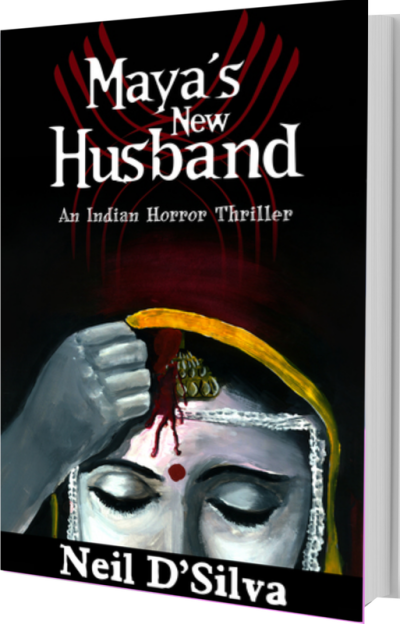When Maya Bhargava was appointed the Head of the Biology Department at the Madam Somdevi Khanna High School for Boys, she felt she had reached a milestone towards the fulfillment of her goals. Having taught in the school for seven years, it was about time she received due recognition for her work. At 33 now, she wasn’t getting any younger.
That day, her first day as H.O.D., she and her friend, the English teacher Padma Murthy, sat in her new cabin and had a discussion on how times had flown. They spoke about their past days in the school, and generally cribbed about other teachers and a few of their students. Padma was on the right side of 40 still, but she hadn’t received the recognition her younger friend had. That was a sore point, but in her English Department, such accolades were rare.
They opened their respective lunchboxes and geared up for their small communal meal. Maya had a preparation of okra and eggplant, a dish Padma truly enjoyed, and Padma had vegetable biryani with paneer, a favorite with Maya.
“The students nowadays!” said Padma between mouthfuls of eggplant. “Atrocious! I happened to confiscate a few of the boys’ phones today. Regrettably, I skimmed through their contents.”
Maya chuckled. “What did you see on them, Padma?”
“Don’t ask!”
“Did you see some boobies?” Maya made an obscene gesture to go with her words.
“Good Lord, Maya!” said Padma, scandalized. “The things you say.”
“Come on, Padma, these are boys! At their age, they are all fighting their hormonal demons. What else did you expect to see? But tell me—didn’t you enjoy it at that age too?”
“Shut up, Maya!” Padma almost dropped her spoon.
“Yeah, don’t act like a saint,” said Maya. “Don’t tell me you were any different as a fifteen-year-old.”
“Certainly not!”
“You know, when I was fifteen, we had this amazing teacher. We used to call him Robinson Sir, and he used to teach History. Oh, what a dreamboat he was! That slickly combed hair and those washboard abs and the neatly ironed formal shirts and trousers he wore! We girls spent a lot of time cursing whoever the bitch his wife was. We had to just smell his deodorant and we would have an orgasm.”
“You are a teacher, for God’s sake, Maya!” said Padma.
“Stop being such a prude, Padma. Loosen up. We are all human under our teachers’ garbs.”
They were busy with their colorful banter when there was a knock at the door. Even before Maya could ask the person to come in, the door opened and a head butted in.
It was Bhaskar Sadachari, the Arts teacher of the school. Everyone knew he had been appointed on the recommendation of Principal Rajkumar Purohit himself, and perhaps the recommendation was justified. He did have some skill in those oddly long fingers of his, which he had shown with his work over the past couple of years. However, the esthetic appeal was limited to his artworks. It didn’t extend to his physical form. His hair was always in a state of disarray, his eyes often bloodshot, and a perpetually overgrown stubble tried in vain to hide the ungainly face that lay underneath. Wherever he went, he left behind aftershocks of comments—people buzzing about his near-complete abandon of any aspect of hygiene.
Through the corner of her eye, Maya saw Padma wrinkling her nose and closing her lunchbox.
“Madam,” the man addressed Maya, completely ignoring her friend, “I’d like to know if you need any help in setting up the models for the Science Exhibition.”
Maya thought. She did need help, for she had ambitious plans to make a few large models. This man, who was known for his artistic skill, could be a good assistant. But, accepting this offer would mean spending time with Mr. Weird Man, and that was something she did not want to do. “Thanks for the offer. I’ll let you know,” she said in a dismissive tone.
Bhaskar was probably too boorish to take that hint, or maybe just too obstinate. He hung at the door awhile, giving the ladies one of his twisted smiles. Padma avoided eye contact by trying to find something in the folds of her saree.
“Yes, you may go,” Maya told him curtly.
The sentence was succinct, but it conveyed what it meant in no mean terms. Being snubbed directly, Bhaskar retreated his head from the door and left.
No sooner did he leave than the ladies began gossiping. “What’s the matter with him?” said Maya. “He is so creepy.”
“Have you seen his neck?” said Padma, shoving the lunchbox aside. “Sorry, I won’t be able to eat now. His neck—it’s so red.”
“Is it? I haven’t really noticed.”
“Rajan Sir told me he saw him in the washroom once, washing his face with his shirt buttons open, and he saw his chest was red too. Initially, I thought it must be a rash, but what is it now—a year?”
“Two!” said Maya emphatically. “It’s two years now.”
Padma moved in closer, the way one does when telling something conspiratorially to a friend. “Also, did you notice? I don’t think he ever bathes. The moment he entered, the room was filled with this awful stink.”
“Stink? Really?” Maya shook her head. “I didn’t get that. Probably it’s my blocked nose.” She let out a mucus-laden sniffle to validate her point.
“He is dreadful but what can we do about it?” asked Padma with her hands in the air. “The Principal is besotted with his work. He’s not going to send him away.”
“Yeah! The children like him too. I keep hearing of all the brilliant drawing he does. However, I find him creepy. It’s not because of his looks, it’s the way he acts. Almost like a stalker.” Maya let out a shudder. “I’ll prepare the models myself, but I am not going to take his help.” The resolution in her voice brought an end to the conversation.
***
Anuradha Bhargava was a contented middle-aged woman, proud of her traditional Maharashtrian roots. Her home was filled with symbols of her religious and communal affiliation, and she was proud of having raised two daughters to be such headstrong, self-believing women. Her older daughter, Maya, had just called to inform that she had been promoted to the Head of Department. She didn’t really understand what H.O.D. meant, but she didn’t want to lose the opportunity to bask in her prized daughter’s glory. Her other daughter, Namrata, worked as a Floor Manager at a suburban mall, which was a big achievement, particularly in the male-dominated environment of mall management. Yes, Anuradha Bhargava was certainly proud of her daughters.
Her only afternoon chore was to prepare lunch for herself. Her daughters ate at their workplaces. Eating a simple but delectable fare of vegetables with chapattis and pickles while watching TV was the highlight of her day.
She finished her chores and sat down on her favorite easy chair and began surfing channels. Her housewifely interests veered towards family soap operas. She could watch several at a time and be passionately affected by all of them. The grandfather clock in the corner told her there was an hour more to watch whatever she pleased. Maya never allowed her to watch her soppy shows once she returned. They curdle your mind, she always said.
When she was engrossed in watching how the daughter-in-law on TV gave a scathing response to her old crone of a mother-in-law, there was an unexpected ring at the door. In a reflex move, Anuradha changed the channel. If Maya had returned earlier than her usual time, she didn’t want to be caught watching this show. When the doorbell went a second time, she got up gingerly and moved towards the door. It scared her to open the door like this; the peephole didn’t help much as the corridor outside was dark in the afternoons, and the safety chain was erratic at best. She made a note to remind Maya about getting a safety door installed.
However, her worry was unjustified. It wasn’t Maya at the door, just the neighboring woman. “Is the electricity working here?” she asked, smiling with her dentally-impaired mouth.
Anuradha nodded, and the woman smiled. She didn’t leave though; it was the unspoken communication between two leisurely elderly women who seek each other’s gossipy company. The electricity had just been an excuse to start a conversation, and it had worked.
“Come in, Laxmi,” said Anuradha, opening the door wide. “I have some good news for you.”
Laxmi sat down on the couch, her bones creaking audibly as she sat. Anuradha put her channel back on and lowered the volume of the TV a bit so that they could still hear it but it would not intrude upon their conversation. “Maya got a promotion today. Headmaster of Department!” she said with suitable awe.
“Oh, that’s great!” Laxmi cackled. “That means Principal, isn’t it? I always knew she will become Principal one day. Our Maya is indeed a talented girl.”
“This is not really Principal,” Anuradha elaborated.
“What did you say?” asked Laxmi. “These days it is difficult to hear anything clearly.”
“Oh, it’s nothing. She got a promotion, that’s all! Would you like tea? I was going to make some anyway.”
“All right,” said Laxmi, “but less sugar, okay?”
Presently, Anuradha came back with two teacups and the room became fragrant with the aroma of masala chai.
“Did you hear about the Bawdi Chawl thing?” asked Laxmi after she had taken her first noisy slurp of the tea.
“What Bawdi Chawl thing?”
“Oh, haven’t you heard?” Laxmi’s face went grave with the importance of someone who is making a somber revelation. Her wrinkles appeared to have increased with that expression. “There was a kidnapping. A young girl of 16-17 years.”
“Who?”
“Who knows about these slum-dwellers? The maid told us. The girl went to college yesterday and hasn’t returned yet.”
“How do you know it’s a kidnapping?”
“What else will it be? Kidnapping, rape, murder, whatever. All the same. She’s a daughter of a cobbler, a pretty girl it seems.”
“It’s horrible,” Anuradha said with sufficient emotion.
“You have two daughters, Anuradha, you need to be very careful. By the grace of Ganesha, I have only sons.”
“You cannot be too sure about sons too these days,” said Anuradha, her traditional upbringing somewhat incensed at having been called the mother of girls. She wasn’t narrow-minded—at least she didn’t consider herself to be—but it was conversations such as these that brought a sense of disquiet to her mind. “Kidnappings have become so common nowadays,” she said. “Anyway, my girls are capable of taking care of themselves.”
The door was slightly open and Maya walked in without warning, worry writ large on her face. “Ma, why is the door open like this?” she asked and then saw Laxmi. “Oh, Laxmi aunty, you are here. Even so, you must keep the door closed.”
“Heard about the kidnapping?” asked Anuradha.
“Congrats on becoming Principal, Maya,” said Laxmi.
“Principal? Oh! No, aunty—”
“Forget that,” said her mother. “See, there was a kidnapping here today. Nowadays, all one reads in the papers is such criminal stuff. Be safe, that’s all.”
“You should tell that to Namrata,” said Maya. “She is the one who returns late at night. And, what’s this? Were you watching that stupid show again?”
Anuradha quickly shut down the television. “Not me,” she said, “this Laxmi here insisted.” She made a sign to Laxmi—a peculiar sign with raised eyebrows that meant she had to play along—and Laxmi quickly gulped the last dregs from her teacup.
***
That evening, there was a small celebration in the Bhargava household. Namrata bought the wine, and the three women cooked a three-course meal together. All three were good cooks, and they could whip up a miracle with their ingredients. The family was vegetarian by choice, quite known in their social circles for their culinary expertise. They prepared their signature dish of cauliflower pakoras to follow up with stuffed eggplant and bhakris and a dessert of carrot halwa.
They sat at the table and began with the wine and the pakoras. Anuradha refused the wine at first but the daughters insisted. “It’s just fermented grape juice, Ma,” said Namrata. “This much won’t kill you.”
“It’s the spirit of the day,” said Maya.
They spoke about Maya’s day at school and about Anuradha’s plan to invest in some gold during Diwali and about how they should contact their relatives in Dadar about a suitable marital alliance for Namrata.
At that point, Namrata chipped in, “No Ma, I have always told you. No arranged marriage for me.”
“So what do you plan to do?”
“That’s my lookout.” At that moment, Namrata seemed every bit like a spoiled younger sibling. She understood that, perhaps, for she braced herself for the inevitable reprimand.
“No one in the Bhargava household has ever had a love marriage if that’s what you think,” boomed Anuradha. “This love-shove does not work for long. I had an arranged marriage, and see what a lovely life I have now. Even though your Dad left us early, God bless his soul, he made sure we didn’t have any problems after him. Don’t you remember Maya’s marriage—”
At that, there was an abrupt silence. Anuradha stopped midsentence and looked down into her plate and started playing with the stalk of an eggplant. Namrata looked at Maya’s face and then Anuradha’s. Maya got up with her half-finished plate.
“Sit down, Maya,” said the mother. “I am sorry.”
“It’s okay Ma,” said Maya. “I’m not hungry anyway.”
“Oh, sit!” quipped Namrata. “Come out of it. It’s two years for Samar now.”
“Shut up, Namrata,” said Anuradha, “what do you understand of these things? It isn’t as easy to take a husband’s loss as you think. Grow up and you will understand. Maya, sit down!”
Maya sat.
“I tried everything,” said Maya, her eyes brimming with tears. “I changed myself for him. He didn’t ask me to, but I knew he wanted me to. We kept each other happy. And still, he went all the way there and—”
Namrata placed a hand on her sister’s shoulder.
“—gave up. Just like that! Who knew he had such sadness in him? Why, Ma? Do you have any answer? Why did he have to throw himself under the train like that?”
Read on for Chapter 1.5 of Maya’s New Husband.







